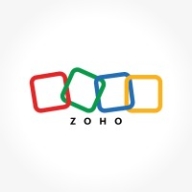

Zoho CRM and Microsoft Dynamics CRM cater to various businesses within the CRM solutions category. Zoho CRM holds an advantage due to its affordability and ease of use for smaller businesses, while Microsoft Dynamics CRM excels in integration and functionality for larger enterprises.
Features: Zoho CRM is known for its lead management, analytics, and seamless integration with other applications, particularly within the Zoho ecosystem. It offers customization options allowing businesses to tailor the CRM to their needs. Microsoft Dynamics CRM excels at integrating with Microsoft products, providing robust sales and service features, as well as powerful reporting and analytics capabilities.
Room for Improvement: Users of Zoho CRM would like enhanced email template creation, better social media integration, and improved mobile application capabilities. Enhanced automation and data management features are also desired. Microsoft Dynamics CRM could improve in user interface design, integration capabilities, and ease of customization. Users seek more intuitive dashboards and better integration documentation.
Ease of Deployment and Customer Service: Zoho CRM offers flexible deployment options, frequently deploying on the public cloud. Its customer service can be inconsistent, but premium plans offer responsive support. Microsoft Dynamics CRM provides diverse deployment options including on-premises and cloud solutions. It is generally regarded for its reliable customer service, though cost remains a concern.
Pricing and ROI: Zoho CRM is cost-effective for small businesses with several pricing plans. It is seen as a value-for-money option, especially when bundled with solutions like Zoho One. Microsoft Dynamics CRM, while more expensive, is considered valuable for larger enterprises due to its comprehensive features. It offers high ROI potential, particularly through automation and efficiency improvements.
I recommend that those considering Microsoft Dynamics CRM conduct an ROI exercise to determine scalability and complex business needs because it is indeed a fantastic tool, especially if Microsoft can provide a better commercial model, which can significantly impact cost-effectiveness.
I would rate customer support as ten out of ten.
While the support operates within their standard SLA, it can be difficult to speak directly with someone over the phone.
Sometimes the technical support for Microsoft Dynamics CRM is not qualified enough, and in some situations, we know the tool better than they do.
Sometimes, they don't understand what my actual needs are.
The 1.5 deduction from 10 is due to cultural communication differences based on where we're getting the support, as sometimes it takes a couple of times to communicate clearly enough for them to understand the issue.
There are multiple blogs and articles available online for self-help.
Microsoft Dynamics CRM is highly scalable, rated at ten, even fifteen out of ten.
I would give it a ten out of ten for scalability.
Microsoft Dynamics CRM is scalable; it's easy to scale, but when customizations become extensive, maintainability can become challenging.
The system is easy to understand, implement coding, and conduct training.
Zoho CRM is quite scalable; I have worked with clients who started with ten companies and have scaled up to managing 500 employees effectively within Zoho CRM.
The platform's global data centers across regions such as the US, EU, and India ensure data security and privacy through ISO certification and strong role-based security, which is essential for handling sensitive customer data.
I would rate it ten out of ten.
There have been instances where issues with Microsoft Azure have affected Dynamics due to the infrastructure layer.
Zoho CRM guarantees 99% uptime, with downtime incidents being very rare.
I find Zoho CRM to be 100% stable and reliable as far as I know.
It is usually compliant with data regulation laws and is HIPAA compliant.
More use-case-oriented material should be provided to help users and implementers learn how to do more, faster.
Microsoft Dynamics CRM needs improvement in simplifying the setup and configuration process, which can be relatively complex when we want all features to work properly.
Microsoft Dynamics CRM doesn't provide solutions that allow you to transform easily if you have a heterogeneous mix of technologies or if your contact center is on analog and you try to digitize it.
The platform does not save code versions similar to GitHub, where you can compare new versions with previous ones.
Some organizations may prefer not to have their data on the internet since Zoho CRM runs as a cloud service.
The main improvement needed for Zoho CRM is introducing SQL code for reports, similar to what's in Zoho Analytics.
The pricing of Microsoft Dynamics CRM can be complex due to Microsoft's complicated licensing model.
Microsoft Dynamics CRM costs about $110 to $115 per user per month, following a recent price increase.
Although it is a good tool, it is costly.
Zoho CRM and all of Zoho's software are quite affordable because they are specifically designed for small and medium businesses.
In terms of my experience with the price and licensing cost, as with setup cost for Zoho CRM, it might not be quite affordable because there are cheaper solutions available.
The backend storage integrates seamlessly with OneDrive, and the solution offers robust security features, including Azure integration, two-factor authentication (2FA), and comprehensive audit trails.
The CRM is very fast, which is the most important aspect, and it's very handy.
The most valuable feature of Microsoft Dynamics CRM is its integration with Outlook and other Microsoft products like Microsoft 365, which includes emails, Teams, and SharePoint.
The most valuable aspect of CRMs, including Zoho CRM, Salesforce, and Microsoft Dynamics, is automation capabilities.
The most valuable feature I have found in Zoho CRM is custom functions. You can achieve anything with it. From integrations with other applications, it is instant.
You can customize everything—what you sell, be it products, services, or projects.
| Product | Market Share (%) |
|---|---|
| Microsoft Dynamics CRM | 4.4% |
| Zoho CRM | 1.8% |
| Other | 93.8% |


| Company Size | Count |
|---|---|
| Small Business | 41 |
| Midsize Enterprise | 22 |
| Large Enterprise | 19 |
| Company Size | Count |
|---|---|
| Small Business | 44 |
| Midsize Enterprise | 6 |
| Large Enterprise | 10 |
Microsoft Dynamics CRM is a comprehensive customer relationship management solution that helps businesses streamline their sales, marketing, and customer service processes. With its user-friendly interface and powerful features, it enables organizations to effectively manage their customer interactions and drive business growth.
One of the key features of Microsoft Dynamics CRM is its sales automation capabilities. It allows sales teams to track leads, manage opportunities, and close deals more efficiently. The solution provides a centralized platform for managing customer information, enabling sales representatives to access real-time data and make informed decisions. It also offers tools for forecasting, pipeline management, and sales analytics, helping businesses optimize their sales processes and drive revenue growth.
In addition to sales automation, Microsoft Dynamics CRM offers robust marketing automation features. It enables marketers to create and execute targeted marketing campaigns, track campaign performance, and generate actionable insights. The solution provides tools for lead management, email marketing, social media integration, and customer segmentation, allowing businesses to engage with their customers effectively and drive marketing ROI.
Furthermore, Microsoft Dynamics CRM helps organizations deliver exceptional customer service. It provides a unified view of customer interactions, enabling customer service representatives to deliver personalized and timely support. The solution offers case management, a knowledge base, and self-service portal capabilities, empowering customers to find answers to their queries and resolve issues on their own. It also provides tools for service analytics and reporting, helping businesses identify areas for improvement and enhance customer satisfaction.
Zoho CRM empowers organizations with a complete customer relationship lifecycle management solution for managing organization-wide Sales, Marketing, Customer Support & Service and Inventory Management.
We monitor all CRM reviews to prevent fraudulent reviews and keep review quality high. We do not post reviews by company employees or direct competitors. We validate each review for authenticity via cross-reference with LinkedIn, and personal follow-up with the reviewer when necessary.